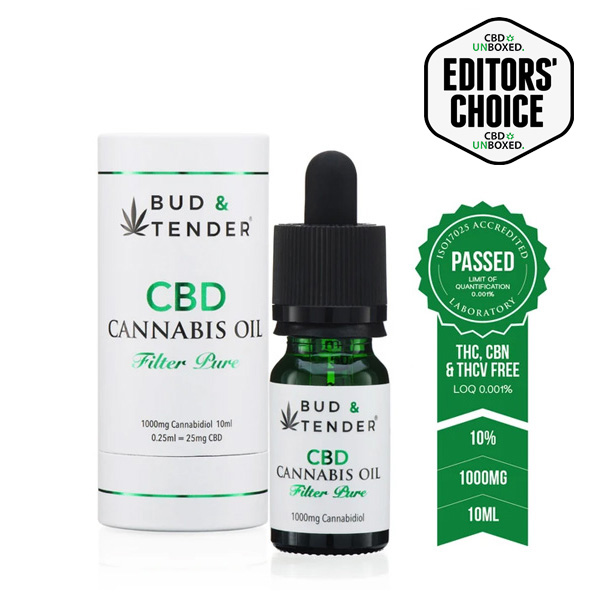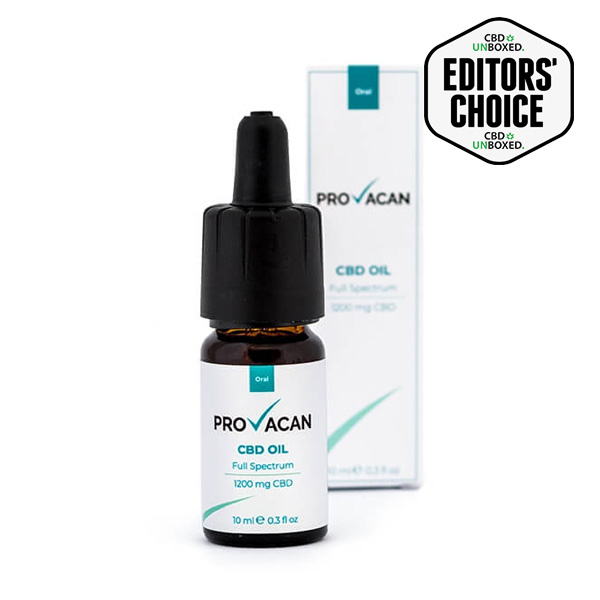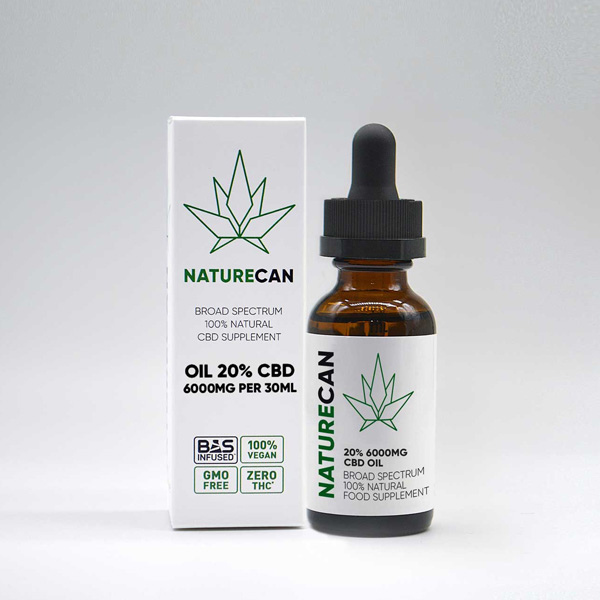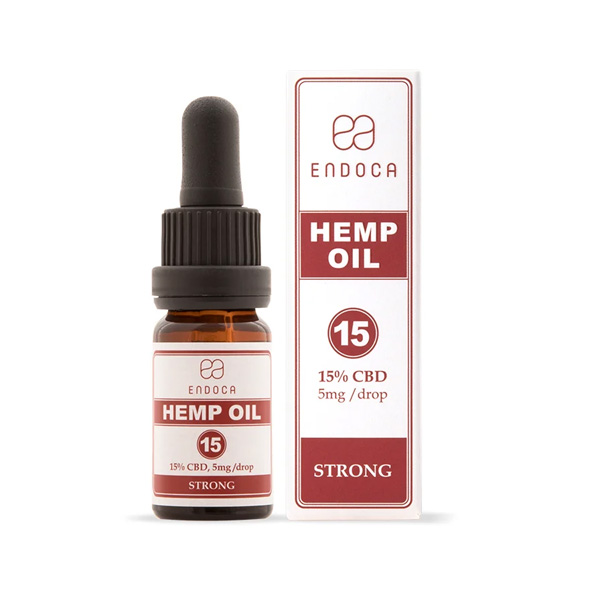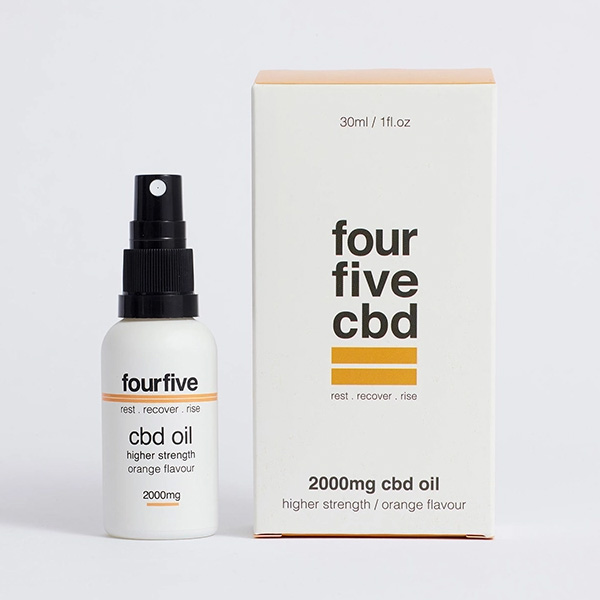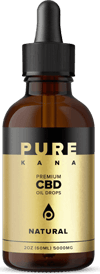New to CBD and struggling to fall or stay asleep at night? We’ve put together this ultimate guide to CBD to help you understand how CBD’s calming properties could help you sleep better. We also list the Best CBD Oils for Sleep and Insomnia at the end of this article.
CBD for Sleep – The Ultimate Guide
According to the National Sleep Foundation, over two-thirds (67%) of UK adults suffer from disrupted sleep and nearly a 25% sleep for five hours or less each night.
Yet, as highlighted by the Mayo Clinic, getting at least seven hours of quality sleep each night is essential for optimal health as it provides the foundation for all of your daily habits and decisions. Sleep deprivation can negatively affect your mood and temperament, as well as your ability to focus on daily tasks, and as a result may interfere not only with your social interactions but with your performance in the workplace.
Choosing CBD, a popular product made from hemp extract (cannabis plant), is a natural way to relax both your body and mind before going to sleep. Best of all, it does not have any of the major side effects of traditional sleeping pills.
In this article we discuss the benefits of CBD oil for sleep based on research papers and peer-reviewed studies. We explain how CBD oil can help you not only fall asleep, but stay asleep throughout the night, and provide links to purchase high quality CBD oils we’ve tried and tested.
Take our CBD Quiz
If after reading this guide you are still unsure about what products to choose, simply take our CBD Quiz which has been designed specifically to identify the product and strength that is best suited to your personal needs.
CBD has been proven to have a calming effect on both the mind and the body, allowing people to fall asleep more easily and stay asleep throughout the night.
What is CBD?

Cannabis (or Marijuana) and hemp are the same plant and come from the Cannabaceae family. Both plants are filled with organic compounds known as “cannabinoids”. Hemp has over 112 different cannabinoids, all of which have their own health benefits.
The main two cannabinoids or compounds of the hemp plant are THC (also known as “Tetrahydrocannabinol”) and CBD (also known as “Cannabidiol”).
THC is the compound known to give cannabis smokers this feeling of “high” and is currently illegal in the UK.
CBD on the other hand, contains none of the psychoactive properties associated with THC (meaning it won’t get you “high”) and is completely legal in the UK. It is also non-addictive and has been suggested to have several medical benefits. Some of these benefits include reducing anxiety and depression, improving sleep and insomnia, reducing pain and inflammation, as well as helping with stress or neurological disorders.
These benefits are possible because CBD interacts with your “Endocannabinoid System” (ECS), which essentially monitors and regulate key functions of your body such as your heat level, your food intake, your hormone levels and so on. When your ECS detects that something is operating outside of what it considers to be its “normal range”, it activates to bring things back to its baseline. If you are exercising and become too hot, your ECS activates and makes you sweat to bring your temperature down. If you need more calories for your body to keep performing (for example running) but you aren’t feeding it, your ECS may start redirecting the energy available towards vital organs such as the heart and brain, leading to a drop in physical performance.
The term Endocannabinoid can be broken down into two parts:
- Cannabinoid: which comes from Cannabis
- Endo: which is short for “Endogenous” and means that it is naturally produced by your body.
So endocannabinoid simply means that your body naturally produces cannabinoids, and does so thanks to cannabinoid receptors present in the body, which fall under two categories:
CB1 Receptors

CB1 receptors, which are located in various regions of the body, with a large concentration in the brain and the nerves of the spinal cord, co-ordinate mood, emotion, appetite, and other functions.
CB2 Receptors

CB2 receptors are more commonly found in the immune system and are responsible for controlling inflammation and pain. CBD stimulates these receptors and induces the body to release serotonin.
Serotonin, or 5-HT, is a neurotransmitter that carries signals from one neuron to the other. CBD increases the level of serotonin, which, in return, helps reduce pain, reduce inflammation in the body and possibly reduces the cramping experienced during period pain.
Whilst there are very few differences between “Marijuana” and “Hemp”, the main difference is simply legal and linked to the level of THC that is present in the plant. So different parts of the cannabis plant are either defined as hemp or as cannabis / marijuana.
- Hemp: hemp is the stalks, stems and sterilized seeds of cannabis sativa (“Cannabis Sativa” is the scientific Latin term that defines hemp, cannabis or marijuana plant species)
- Cannabis and Marijuana: the leaves, flowers and viable seeds of cannabis sativa
The varieties of cannabis that are regulated, legal and available in the UK are those that produce less than 0.2 percent THC. And given the fact that most THC is in the flowers, CBD products are primarily made from hemp (stalks, stems and sterilized seeds of cannabis sativa) which contain very little THC and are safe to consume.
There has been a lot of interest in CBD from both the research and medical community over the last few years, due to its range of health applications – including but not limited to pain relief, fighting the side effects of cancer medications, alleviating insomnia, lowering stress levels, improving acne outbreaks, counteracting heat disease, or reducing seizures in patients with epilepsy
For all these reasons, CBD products are legal in the UK if they contain less than 0.2% THC and as long as they are advertised as a health supplement and not a medication.
Products containing CBD come in many different forms, with the most common including CBD oils, CBD gummies, CBD capsules, CBD vapes and CBD edibles. Some forms are more fast-acting than others, some have different flavours, some contain differing proportions of CBD extract, and so on, so the type you choose depends entirely upon your personal preferences and the condition you wish to treat.
Here’s what you need to know about using CBD for sleep and insomnia.
Sleep & Insomnia: What You Need to Know
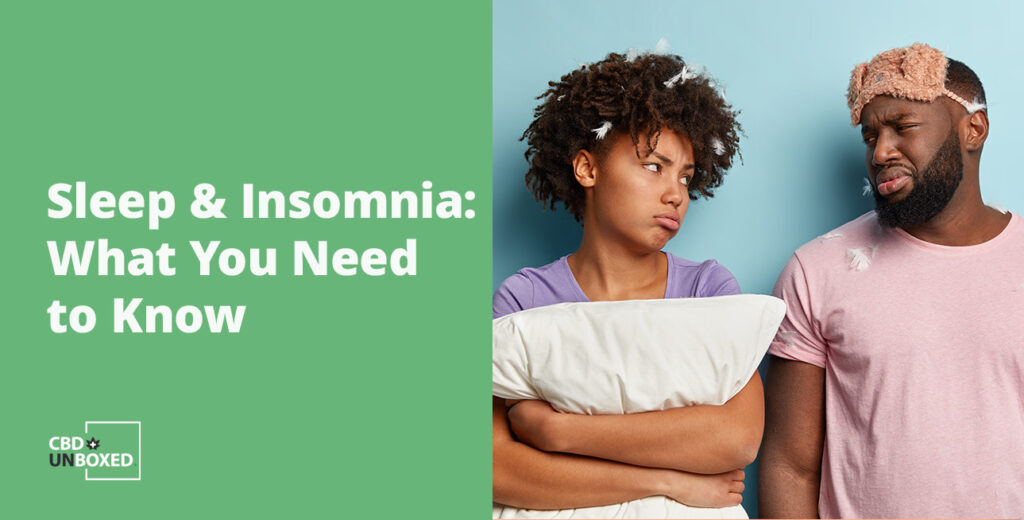
Whilst struggling to fall asleep or experiencing sleepless nights every now and again is completely normal as the body and mind may respond to increased stress, increased workload or a traumatic event, on-going insomnia or difficulties to fall asleep and stay asleep may be a sign of something more significant causing distress and impacting one’s ability to carry out their daily life.
Whilst the Mayo Clinic emphasises that most adults need seven to eight hours a night, nearly 23 per cent of people living in the UK only sleep between five and six hours at night. That’s an estimated 34.5 minutes less than the rest of the world.
Insomnia symptoms are varied and can include:
- Difficulty falling asleep
- Waking up in the middle of the night
- Constantly waking up earlier than expected
- Feeling tired and groggy after a night’s sleep
- Feeling tired and sleepy during the day
- Overall irritability, depression or anxiety
- Difficulty focusing on specific tasks, paying attention to or remembering things
- General stress and worries about sleep
This lack of sleep has a lot of fallout.
- Loss of productivity: 200,000 working days are lost yearly in the UK over insufficient sleep
- Increase mortality: Adults sleeping less than 6 hours at night have a 13 per cent higher mortality risk
- Increased obesity: Adults sleeping less than 7 hours at night are 30 per cent more likely to be obese
Causes of Insomnia & Poor Sleep
According to the Mayo Clinic, insomnia can be caused by a number of factors, including but not limited to:
- Mental health disorders (anxiety, PTSD and depression)
- Medication, which can disturb your sleep cycles
- Physical conditions, including chronic pain and restless leg syndrome
- Food and drink consumption such as caffeine cosumed in the evening
- Environmental factors (room temperature, noisy environment, uncomfortable bed or pillow)
Insomnia caused by external factors can be easily addressed – for example by reducing your caffeine consumption in the evening, changing your mattress or pillow, or buying ear-plugs to block external noises.
However, CBD can also help by treating the causes of insomnia and sleeplessness.
5 Common Sleep Related Disorders
There are various conditions that may prevent people from getting a good night’s rest. Yet, most sleep disturbances tend to occur because of stress and anxiety. Calming down the mind is the best way to help people who can’t fall asleep fast or stay asleep get the relief they need.
The main sleep related disorders include:
Insomnia – Studies in the UK show 31 per cent of adults have insomnia. Many consumers take CBD to reduce anxiety and high-stress levels. Anxious and racing thoughts are the leading cause of insomnia. Dr Herve Damas, an endocannabinoid expert, explains to Prevention Magazine, “CBD has been shown to have anxiety-relieving effects, and anxiety disorders can be a cause of insomnia.”
Circadian rhythm disorders – Fewer citizens in the UK have circadian rhythm disorders. Research is available about the potential benefits of CBD for CRD. As mentioned, the ECS helps regulate sleep cycles. The few participants in studies saw improved sleep with cannabidiol.
Restless legs syndrome – The few reports available show CBD may help consumers losing sleep to movement disorders. Medical researchers don’t know much about the cause of the condition. Many patients need narcotics to reduce the movements, which aren’t safe for long-term use.
Idiopathic hypersomnia – The uncommon disorder is dangerous because it leaves suffers groggy and sleepy nearly all the time. One study proposes that in the right doses, CBD can act as a wake-promoting agent.
Parasomnias – Another rare condition that causes people to complete tasks in their sleep, taking away from their rest, and putting them in potentially dangerous situations. Experts have been studying CBD and NREM sleep disorders for a few years. A 2014 report reviewed the connections between NREM sleep disorders, nocturnal seizures, and CBD. Researchers already know the value of CBD as a treatment for seizure disorders.
Side Effects of Sleeping Pills
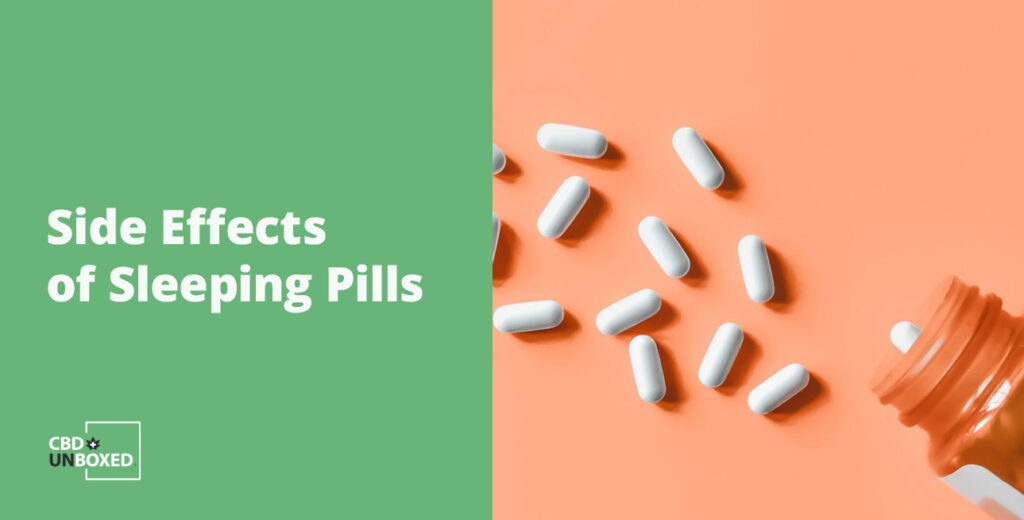
Seeing as there is no known cure for sleeping disorders such as insomnia, doctors primarily focus on medicating patients using sleeping pills to get them to sleep or anxiety medication to get their overall level of stress under control.
Medications prescribed by doctors include:
Sleeping Pills
Prescription drugs like diphenhydramine (Benadryl, Aleve PM, others) or doxylamine succinate (Unisom Sleep Tabs) are both sedating antihistamines. Whilst they offer some help when it comes to allowing patients to fall asleep more easily, they can become very addictive over time and may lead to substance abuse.
Antidepressants: SNRIs & SSRIs
If anxiety, stress or depression is the root cause of the lack of sleep, doctors may prescribe antidepressants. These tend to fall under one of two categories:
- SNRIs: Serotonin and noradrenaline reuptake inhibitors, also known as SNRIs, are used to treat major depression and associated mood disorders. They work by raising the levels of serotonin and norepinephrine, two neurotransmitters in the brain that play a key role in stabilizing mood.
- SSRIs: Selective serotonin reuptake inhibitors, also referred to as SSRIs, are also used to treat depression and are one of the main antidepressants prescribed today. SSRIs work by blocking the absorption of serotonin in the brain to facilitate the sending and receiving of messages by brain cells which results in better and more stable mood. SSRIs tend to have fewer side effects than other antidepressants and are therefore a popular medication to treat patients suffering from depression.
Not only do these antidepressants have a substantial time lag to induce therapeutic response, meaning that several weeks of treatment are necessary to generate a positive response, but their overall efficacy also remains quite low with a third of patients not responding to the treatment itself.
Side Effects of Antidepressants
More worryingly though, they come with a long list of side effects which shouldn’t be ignored:
- Low blood sugar (hypoglycemia)
- Nausea and vomiting
- Constipation or diarrhoea
- Weight loss
- Low sodium
- Skin issues such as rashes
- Dry mouth
- Excessive sweating
- Muscle issues such as tremors
- Low sex drive and sexual dysfunction
- Insomnia
- Migraines and headaches
- Anxiety
- Agitation and abnormal thinking
In children and teenagers, there also seems to be a link between antidepressants and suicidal thoughts.
According to a recent analysis of short-term placebo-controlled trials of antidepressants carried out in the US, including SSRIs, in children and teenagers, suffering from major depressive disorder, known as MDD, the average risk of suicide during the first few months of treatment was 4%, twice the risk of the placebo group which stood at 2%.
The second aspect to consider when looking at antidepressants is the fact that patients taking SNRIS or SSRIs can become addicted to them. This addiction is mainly linked to the physical dependence an individual may develop regarding the drug, meaning that they may experience withdrawal symptoms such as headaches, nausea, vomiting and tremors if they were to suddenly stop taking the drug.
On the other hand, severe mental health issues such as depression can be treated with cognitive behavioural therapy, exercise and psychotherapy. While these schools of treatment are effective for many conditions, they are not always right for every person and can only address part of the problem.
CBD for Sleep Related Disorders
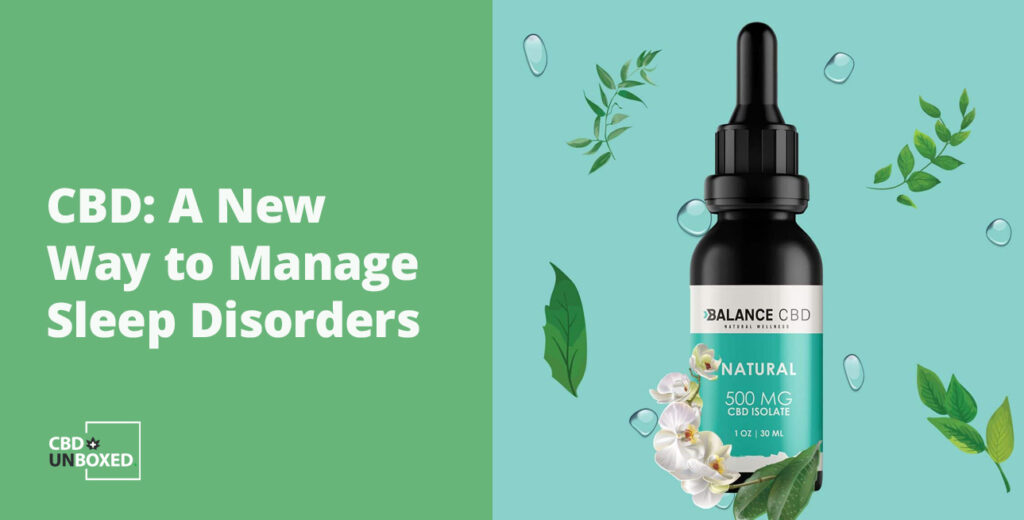
Although people have been using herbal remedies for sleep, anxiety, or pain for centuries, it wasn’t until the last few years that hemp’s legal status changed to allow more users and additional studies.
Cannabidiol, the scientific name for CBD, on the other hand is a naturally occurring compound coming from the hemp plant that helps people fight inflammation, pain and various health related issues.
There is extensive research on the effectiveness of CBD oil when used to help patients suffering from sleep related disorders both fall asleep and stay asleep throughout the night.
CBD Can Improve Your Sleep

CBD works with the human body to increase calm, decrease stress, and lower anxiety levels. These responses indirectly improve your sleep. In the 1990s, researchers confirmed the body has an endocannabinoid system or ECS. Researchers have only found a link between the cannabinoids found in hemp with the ECS, making it an unusual reaction.
The ECS is a complex cell-signalling system consisting of endocannabinoids, cannabinoid receptors, and enzymes. Scientists believe it plays many roles, including maintaining balance in the body. When it comes to sleep, the ECS helps regulate sleep and sleep cycles. Also, relating to sleep, a potential function is boosting anandamide to reduce depression and anxiety.
The cannabinoid receptors interact with endocannabinoids and cannabinoids. The CB1 is located in the nervous system and brain. Additionally, the CB2 is found mostly in the immune system and most organs.
A recent surge in scientific publications has found preclinical and clinical evidence documenting value for CBD in some neuropsychiatric disorders, including epilepsy, anxiety, and schizophrenia. Evidence points toward a calming effect for CBD in the central nervous system.
In 2019, a large case series was published in the Permanente Journal about CBD’s calming effects on the central nervous system. The studies showed patients taking CBD saw lower anxiety levels, experienced less stress, and slept better at night. Additionally, most participants experienced no or few side effects.
So through its pain relief and calming effect, CBD may help people fall asleep faster and stay asleep throughout the night.
CBD: The ‘Entourage Effect’

Now that you know how CBD can help you get better sleep at night, it is important to understand the concept of ‘entourage effect’.
The entourage effect is the theory that while each botanical compound has a unique role or benefit, its behaviour may change when the presence of another compound is present.
For example, it would be more effective and quicker to produce a play with a team of actors rather than one actor playing all the parts. When each actor has a specific role to focus on, they can learn their lines and direction and support their fellow actors. But one actor alone will take a lot longer to learn all the lines for the various parts they have to play.
This is similar to the entourage effect. Essentially, everyone knows their role, but their performance can be enhanced by comradery.
But how is this applied to CBD?
CBD Entourage
We know that CBD products stimulate the endocannabinoid system and make it work more efficiently. But different CBD products affect the ECS differently, depending on their formulation. As previously, discussed there are 3 types of CBD formulation:
- Full-spectrum: No additional extraction, contains all the natural ingredients of the hemp plant, including CBD, THC, terpenes and flavonoids.
- Broad-spectrum: All traces of THC are removed from the oil. Every other ingredient remains.
- CBD Isolate: The oil only contains CBD, everything else is removed.
One of the above formulations has been proven to give better results in reducing pain, inflammation and many other symptoms. Which one of these formulations do you think stimulates the ECS best?
Would it be the most natural substance (full-spectrum), the one with any psychoactive ingredients (broad-spectrum) or the purest form of CBD (isolate)?
According to the entourage effect, it is the full-spectrum CBD because it keeps all the natural components of the hemp plant, which include:
Cannabinoids and Terpenes
The theory of the entourage effect was first introduced by Dr Ethan B. Russo. He thinks that cannabinoids such as CBD and THC work with terpenes (aromatic component) to produce a “synergy.”
In his study “Taming THC: Potential cannabis synergy and phytocannabinoid-terpenoid entourage effects” (2010) Dr Ethan B Russo suggests:
- The terpene pinene, which gives the scent of pine, may help counteract compromised memory caused by THC.
- CBD and terpene limonene, which gives a citrus scent, might work together to alleviate anxiety.
- A combination of CBD and terpene caryophyllene, offering a pepper smell, may be beneficial in the treatment of addiction.
The possibility of “synergy” of endless but have not yet been categorically proven. For more information read his other study “The Case for the Entourage Effect and Conventional Breeding of Clinical Cannabis: No “Strain, No Gain” published in 2019.
Omega-3, Antioxidants and Nutrients
In addition to CBD, THC and terpenes, full-spectrum CBD oil also contains Omega-3, which is vital to the ECS. Omega-3 is used to maintain the receptor CB1, which regulate pain and memory.
It also aids the absorption of external cannabinoids, as well as making endocannabinoids internally.
Other nutrients and antioxidants have also been discovered in full-spectrum CBD oil, for example, Vitamin E. Vitamin E is a fat-soluble compound that can prevent cataract formation, postpone the appearance of wrinkles and grey hair, boosts the immune system and reduces inflammation.
As you can see CBD oil when first extracted from the hemp plant has a huge list of ingredients. All of them seem to play a part in helping our bodies. We may not know exactly what they all do. But as time passes and research continues, we can learn more.
Is CBD Legal in the UK?

CBD oil, like any other natural remedy, has been used throughout the ages for its medicinal properties. It was evidenced to have been used in ancient societies with the first recorded case in 2727 B.C in China. It was used to treat anything from poor memory and malaria to gout. It has since been used throughout the world to treat various ailments from anxiety to insomnia and menstrual pains.
Throughout the 1940s, there was extensive research into isolating the CBD compound from the other 100+ compounds found within the marijuana plant, due to its lack of psychoactive effects.
It wasn’t until the 1970’s when the US legally recognised the medicinal worth of CBD oil, and it was decriminalised in Oregon. There was a large emphasis on the clear distinction between the CBD compound and the THC compound within the marijuana plant.
The UK followed suit in 2016, making it legal to buy CBD oil to help treat a multitude of health issues, including but not limited to:
- Depression and anxiety disorders (PTSD, OCD, panic disorder or substance/addiction disorders)
- Chronic pain and inflammation
- Epilepsy
- Heart issues
- Helps to reduce blood pressure and oxidative stress
- Diabetes
- Fight bacteria
- Insomnia and sleep related issues
- Helps with symptoms of schizophrenia,
- Skin conditions (psoriasis/eczema)
- Alzheimer’s disease
In a study conducted by the Centre for Medical Cannabis, their results showed that one in six adults in the UK had tried CBD oil, proving that it is one of the fastest-growing, contemporary, well-being products on the market.
Figures also show that the rates of people using CBD oil were higher amongst the under 55 age range. Also, figures were higher amongst females, with 62% of them using CBD to treat anxiety related issues.
How to Take CBD for Sleep?

There are a few ways to take CBD for sleep related disorders. Choosing a method is often a personal preference. The most common are tinctures, gummies, capsules, vapes and topicals.
CBD Tinctures

CBD oil is the most common way of getting your daily dose of CBD to help you drift to sleep.
However, whilst this is the most popular way to consume CBD, CBD oil often has a more earthy, nutty, woody or grass-like taste which is down to the fact the product is natural, safe, and non-toxic.
You can use CBD oil in different manners.
You can either place a few drops under the tongue and hold it there for 30 to 60 seconds. This way of consuming CBD – called sub-lingual. This is one of the best ways to get it absorbed into the bloodstream as this method allows CBD to completely bypass the digestive system and liver metabolism, so the compounds can avoid being broken down by enzymes and reach the bloodstream more quickly. This offers the quickest relief with an onset of 20 minutes or less.
For those who feel the earthy or grassy taste of CBD is too strong, another option is to mix it with a food or a drink to mask the taste. However, be aware that when you digest CBD, it will not provide immediate relief and you may need to wait 30 to 60 minutes for it to start working.
CBD Capsules

If the earthy and grassy taste of CBD oil or its sharp and bitter aftertaste is not for you, you may want to choose CBD capsules to experience all the benefits of CBD without any of the nasty taste or additives that gummies may contain (such as sugar).
CBD capsules are filled with a precise dose of CBD (usually between 10mg and 50mg of CBD per capsule). You can take one or two capsules, once or twice daily with a full glass of water. The CBD usually comes from full-spectrum (<0.01% THC) ground hemp and is rich in cannabinoids and terpenes. However, seeing as CBD capsules go through the digestive system, they take about an hour or so to work.
Choosing capsules is a great way to get your CBD intake and it’s incredibly travel friendly, the ideal solution for those who are always on the go.
CBD Gummies

For consumers who aren’t comfortable using the sublingual drops or those who struggle to swallow capsules, the CBD-infused chewy candies are a yummy way to consume the hemp extract.
Using CBD gummies is also an easy and accurate way of measuring that you are getting the right amount of CBD as each gummy will provide you with an exact dose of CBD (from 10mg to 50mg).
Unlike CBD oil which acts within 20-30 minutes as it gets absorbed into the blood stream, the onset for CBD gummies is about an hour as edibles need to go through the digestive system.
Finally, remember that gummies tend to contain additional ingredients – including sugar and additives. So whilst gummies are a convenient way to get your daily intake of CBD to treat your pain, eating 3-5 gummies each day could have a negative impact on your overall sugar intake! This isn’t always ideal and for that reason, we would always recommend going for CBD oil or CBD capsules whenever possible.
CBD Vapes

Whilst the team at CBD Unboxed isn’t pro-smoking or pro-vaping, using a vape and inhaling CBD appears to be a great way to get your daily dose of CBD as the heating process occurring whilst smoking increases absorption.
How? By smoking CBD, the active compounds quickly enter the bloodstream via the lungs where they are transported throughout the body. Compared to oral intake such as gummies and capsules, vaping avoids the liver breaking down many of CBD’s beneficial compounds which enhances its potency.
Also, unlike edibles which often contain additional ingredients, the only two ingredients present in CBD vapes and vape juices tend to be cannabinoids and terpenes, natural substances commonly found in herbs, fruits, flowers and plants.
Whilst this seems a great way to get your daily CBD intake, we cannot comment on its use or efficacy as we have not tried vaping products and most research papers to this day have focused on CBD oil.
How Much CBD Should You Consume?

CBD doesn’t have one-size-fits-all dosing and calculating a proper dosage of CBD can be tough as our bodies react to it differently.
CBD Dosage Table
We would first recommend using the above CBD dosage table to determine how much CBD you should consume on a daily basis.
The four major factors affecting your CBD dosage are:
- Your weight
- The condition being treated (i.e. depression, chronic pain etc)
- The severity of your condition
- The concentration of CBD oil
Most brands recommend customers start with the lowest dose and increase until they find the right serving size that fits their needs. The most common starting amount is between 10mg and 25mg. For anxiety and depression, the dose can vary from 20mg to 50mg or more.
As a rule of thumb, a person weighting between 10.5 and 17 stones (approximately 150 and 240 lbs) may need between 20mg and 40mg of CBD per day depending on the severity of their symptoms.
When using CBD for the first time, we would always recommend starting with one or two drops of the 3% or 6% CBD oil placed under the tongue (sublingual) and holding it there for at least 30 seconds so it can absorb into the bloodstream.
Taking it first thing in the morning on an empty stomach to see how your body reacts to it is also recommended. If you are not seeing any major benefits with a single drop, increase your intake by a single drop every 2 or 3 days until finding the right balance to treat your personal symptoms.
Finally, as CBD remains a novel food, it is worth noting that the Food Standards Agency (FSA) recommends that healthy adults do not take more than 70mg a day, unless advised by a medical professional.
How Many CBD Oil Drops?
Whilst it may be confusing at the beginning, it’s incredibly simple to work out how many drops of CBD oil you need to take depending on your daily requirements and the strength of the product you bought.
Most bottles of CBD oil contain 10ml of product and come in strengths ranging from 300mg to 2,400mg – also known as 3% and 24% CBD oils. This simply means that in a 1ml drop of the 300mg bottle, you will have 30mg of CBD, whilst the same 1ml of the 2,400mg bottle will give you 8 times that amount for a total of 240mg of CBD.
So assuming you need to hit 25mg of CBD per day with, you will need:
| CBD / Bottle* | CBD / Drop | # Drops |
| 500mg | 1.25mg | 20 drops |
| 1000mg | 2.5mg | 10 drops |
| 1800mg | 4.5mg | 5.5 drops |
| 2400mg | 6.0mg | 4 drops |
*Based on 10ml bottles
Assuming you are using the 500mg CBD oil for a daily dose of 25mg, you will need to take approximately 20 drops per day (25mg divided by 1.25mg per drop). You could break this down throughout the day by taking:
- 8 drops first thing in the morning on an empty stomach
- 6 drops early afternoon
- 6 drops at night before going to bed
If however you bought the 2400mg CBD oil for a daily dose of 25mg, you would only need to take 4 drops per day (25mg divided by 6mg per drop), which you could also spread across the day – 2 in the morning, one in the afternoon and one in the evening.
As with everything, start with a small amount of CBD oil daily to make sure there’s no reaction, then increase slowly by a drop every 1-2 days until finding the right balance.
What to Expect When Taking CBD?

First-time users may experience relief immediately, as CBD is brand new to your ECS. However, this does depend on the ailment you are trying to improve. For example, one dose of CBD could relieve pain, reduce anxiety and reduce nausea but it wouldn’t stop seizures, cure your depression or diabetes.
If it took you a long time to get the symptom then the same will be said for reducing, preventing or eliminating it.
Immediate Relief (After 24 hours a noticeable difference is seen):
Pain, Inflammation, Migraines, Nausea, Anxiety, Arthritis, Epilepsy, Glaucoma, Stress, Insomnia, Multiple Sclerosis, PTSD, Rheumatism and Motion Sickness.
Short Term Relief (Noticeable between 2-14 days):
Acne, Inflammation, ADD/ADHD, Anxiety, Arthritis, Epilepsy, Depression, Stress, Insomnia, Multiple Sclerosis, PTSD, Rheumatism, Endocrine Disorders, Obesity, OCD, Spinal Cord Injury and Rheumatism.
Long Term Relief (Noticeable between 2+ weeks):
ALS, Addiction, Alzheimer’s Disease, Asthma, Atherosclerosis, Autism, Bipolar Disorder, Cancer, Inflammatory Bowel Disease, Depression, Diabetes, Endocrine Disorders, Fatty Liver Disease, Fibromyalgia, Heart Disease, Huntington´s Disease, Kidney Disease, Metabolic Syndrome, Mood Disorders, Neurodegeneration, Obesity, Parkinson´s Disease, Prion Disease, Schizophrenia and Traumatic Brain Injury.
As you can see from the above, symptoms which occur quickly can be improved in the same short time frame. Progressive illnesses and their more severe side effects require longer exposure to CBD before a real difference can be seen.
This is just a general guide, and it’s important to note that every single person will react differently to CBD as no one person has the same biology and lifestyle.
What are the Side Effects of CBD?
Most people do not experience any side effects when taking CBD as this is a natural product. However, as with everything, some people may experience mild side-effects from the hemp extract, including:
- Diarrhoea
- Changes in appetite and weight
- Nausea
- Fatigue
- Irritability
- Drowsiness (a good thing to fall asleep!)
The best way to decrease adverse reactions is to simply lower your daily intake of CBD, or if taking CBD oil under the tongue, to mix it with your food and drink as it will be processed by the digestive system – which means slower absorption. The downside of mixing it with your food is a decreased bioavailability so CBD may not work as well for you.
How To Choose Quality CBD?

As with anything you ingest, the source and quality of your CBD products are important. We would always recommend looking at five main aspects before choosing your CBD product.
CBD Oil from Organic Hemp
Hemp can be grown in just the same way as any other plant – mass-produced and using pesticides and GMOs for the greatest profit, or grown organically with care and attention to provide a fantastic end product.
The best CBD is produced from organic hemp that has benefited from plenty of rain during the growing process. While hemp can physically be grown in many countries, it grows best when the temperature is in the low twenties Celsius. Therefore, the location of the hemp farm is important to ensure the optimum environmental factors are accommodated.
And seeing as cannabis plants can be stressed out by the weather, resulting in a higher THC content (above 0.2%), it’s important to ensure that your CBD oil comes from organic hemp which has been grown in the right part of the world.
Less Than 0.2% THC
Cannabis flowers and extracts usually contain two cannabinoids known as THC (tetrahydrocannabinol) and CBD (cannabidiol). Yet the exact percentage of each can vary greatly, depending on the plant variety and the growing technique used.
THC is the main psychoactive compound in cannabis that produces the high sensation, while CBD has been associated with health benefits.
The EU common agricultural policy states that cannabis plant can be grown for industrial uses, provided their THC content does not exceed 0.2 %. That’s in the plant, not in the CBD product you buy.
So when buying CBD oil from a shop or online retailer, be sure to check that their products contain less than 0.2% THC.
Clean Extraction Method
Once the hemp is grown and harvested, the CBD needs to be extracted from the plant. There are several methods for doing this, including the use of carbon dioxide (CO2). This produces the cleanest and purest CBD extract but can be expensive to do as the machinery required is not cheap.
Alternative methods include using solvents such as ethanol or plant oils (eg olive oil) to extract the CBD.
This can lead to less-pure CBD extract, as small amounts of solvent or oil can remain, although most companies using this type of extraction method will usually test their CBD extracts to ensure they are solvent free and safe to consume.
Tested by Independent Labs
Another thing we would recommend checking is whether or not your CBD oil has contaminants. That’s because cannabis plants readily absorb heavy metals, pesticides, and other potentially harmful chemicals that may be in the soil or water.
To ensure your CBD oil is free of those harmful chemicals, it should be tested frequently while the hemp is growing, and finished products should also be tested, using validated methods.
The extract should be tested and certified by a third-party laboratory to confirm the quality of the CBD. Organic CBD should be GMO-free, pesticide-free, and as pure as possible. In the UK and EU, CBD must register THC content of 0.2% or lower.
Most reputable companies selling CBD oil in the UK publish their lab results on their website. Below are a few examples of companies that play the transparency card with their customer and share their lab results for each batch of CBD they produce:
- Blessed CBD
- Provacan
- Hempura
- Endoca
- Naturecan CBD
- Medterra
- Love CBD
Strength to Match your Needs
Finally, the CBD level within any product should be of a suitable strength to match your needs. Every person is different and their body will respond in a slightly different way, so the level may partially be down to personal preference.
However, higher concentrations might be more suitable for treating different ailments to lower concentrations, and it is wise to check the level of CBD in every product you use.
As a rule of thumb, people looking to use CBD for sleep, anxiety, digestion, relaxation or stress might take between 10mg and 25mg of CBD daily and use the lowest strength (300mg to 600mg), whilst those using CBD as a pain relief for conditions such as severe arthritis, back pain or migraines may want to take 30mg to 50mg of CBD per day and use higher concentration products (1200mg to 2400mg).
So remember that CBD oil comes in different concentration and that this will impact how many drops you need to take – for example Blessed 500mg CBD oil (5%) contains 1.25mg of CBD per drop, whilst their 1800mg CBD oil (18%) contains 4.5mg of CBD per drop.
Top 5 CBD Oils for Sleep

With over 150 CBD brands on the market, it can be difficult to choose the right CBD product. This is why the CBD Unboxed team has tried and tested all most CBD products and brands available in the UK market and assessed them across 6 key areas: Efficacy, Taste, Value for Money, Third Party Certification, Packaging and Shipping & Delivery.
Based on our findings and whilst every person will be different, we would recommend the below five CBD oils to start with.
- 10ml bottle (1000mg of CBD)
- 10% concentration
- Approx 2.5mg of CBD per drop
- Broad spectrum CBD
- Zero THC
- Organic MCT carrier oil
- Entourage effect
- 30ml per bottle (3000mg of CBD)
- 10% concentration
- Approx 2.5mg of CBD per drop
- 99%+ Pure CBD (isolate)
- Zero THC
- MCT oil carrier
- 10ml per bottle (1000mg of CBD)
- 10% concentration
- Approx 4mg of CBD per drop
- Full spectrum CBD
- Less than 0.2% THC
- Hemp seed oil carrier
- Entourage effect
- 10ml bottle (1200mg of CBD)
- 12% concentration
- Approx 3mg of CBD per drop
- Full spectrum CBD
- Less than 0.05% THC guaranteed
- Olive oil carrier
- Entourage effect
- 10ml bottle (2000mg of CBD)
- 20% concentration
- Approx 8mg of CBD per drop
- Broad spectrum CBD (THC free)
- Organic MCT carrier oil
- Entourage effect
- Suitable for vegans
- 10ml bottle (1500mg of CBD)
- 15% concentration
- Approx 5mg of CBD per drop
- Full spectrum CBD
- Less than 0.2% THC
- Hemp seed oil carrier
- Entourage effect
- 20ml per bottle (2000mg of CBD)
- 10% concentration
- Approx 16mg of CBD per spray
- Broad spectrum CBD
- Zero THC
- Olive oil carrier
- Entourage effect
- 30ml per bottle (2000mg of CBD)
- Approx. 8.3mg of CBD per spray
- Approx. 240 sprays per bottle
- Broad-spectrum CBD
- Zero THC
- MCT oil carrier
- 10ml per bottle (1000mg of CBD)
- 10% concentration
- Approx 5mg of CBD per drop
- Full spectrum CBD
- Less than 0.02% THC
- Hemp oil carrier
- Entourage effect
Bud & Tender CBD
Bud & Tender CBD Oil 1000mg (10%)
£80.00
Medterra CBD
Medterra CBD Oil 3000mg (10%)
£89.99
Blessed CBD
Blessed CBD Oil 1000mg (10%)
£74.95
Provacan CBD
Provacan CBD Oil 1200mg (12%)
£69.99
Naturecan CBD
Naturecan CBD Oil 2000mg (20%)
£84.99
Endoca CBD
Endoca CBD Oil 1500mg (15%)
£119.00
Love CBD
Love CBD Entourage Oil 2000mg (10%)
£99.99
Four Five CBD
Four Five CBD Oil 2000mg (6%)
£90.00
Hempura CBD
Hempura CBD Oil 1000mg (10%)
£64.99
Take the CBD Quiz
If after reading this guide you are still unsure about what products to choose to help you fall asleep and stay asleep throughout the night, simply take our CBD Quiz which has been designed specifically to identify the product and strength that is best suited to your personal needs.









